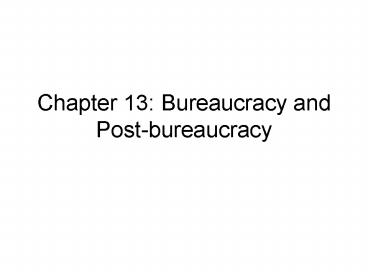Chapter 13: Bureaucracy and Postbureaucracy - PowerPoint PPT Presentation
1 / 16
Title:
Chapter 13: Bureaucracy and Postbureaucracy
Description:
Explain the problems of each from mainstream perspectives ... Prejudices (Crozier, 1964) Mock-bureaucracy (Gouldner, 1954) The end of bureaucracy? ... – PowerPoint PPT presentation
Number of Views:413
Avg rating:3.0/5.0
Title: Chapter 13: Bureaucracy and Postbureaucracy
1
Chapter 13 Bureaucracy and Post-bureaucracy
2
Chapter aims
- Explain bureaucracy and post-bureaucracy
- Explain the problems of each from mainstream
perspectives - Identify critical approaches to each model
- Explain the strengths and weaknesses of the
critical approaches
3
Overview
- Bureaucracy
- Based on rules, hierarchy, impersonality and a
division of labour - Dominant form of organization for more than a
century - Mainstream critique Has problems of poor
motivation, producer focus and inertia - Critical critique Preoccupation with efficiency,
dehumanizing - Post-bureaucracy
- Based on trust, empowerment, personal treatment
and shared responsibility - Mainstream critique Has problems of loss of
control, risk and unfairness - Critical critique Preoccupation with efficiency,
an extension of control
4
Weber on bureaucracy
- Weber the founding father of bureaucracy
- Observed that society held together by authority
- 3 types of authority
- Charismatic personal authority of individuals
- Traditional established authority of
institutions - Rational-legal system of rules devised for
rational reasons - Weber argues society increasingly based on
rational-legal authority
5
Webers principles of bureaucracy
- Functional specialization
- Hierarchy of authority
- System of rules
- Impersonality
6
From bureaucracy to post-bureaucracy
- Alleged shift from industrial to
post-industrial society since 1970s - Shift from mass production of standard products
to niche products - Employee demand for flexibility and autonomy
- Alleged development of a new organizational form
- The post-bureaucracy
7
Hecksher on post-bureaucracy
- The ideal-type
- Rules are replaced with consensus and dialogue
based on personal influence - Responsibilities are assigned on merit rather
than hierarchy - People are treated as individuals rather than
impersonally - The boundaries of the organization are opened
8
Key problems
- Bureaucracy
- Motivation excessive rule-following
- Customer service due to poor motivation
- Resistance to innovation and change
- Post-bureaucracy
- Control relies on normative control
- Risk of bad decisions if people have greater
discretion - Fairness possibility of treatment based on
prejudices
9
Dysfunctions of bureaucracy
- Are bureaucracies as rational as they appear?
- 2 arguments
- Over-attachment to rules can be inefficient
- Goal-displacement (Merton, 1940)
- Work to rule (Blau, 1955)
- Rules can be ignored, leading to inefficiency
- Prejudices (Crozier, 1964)
- Mock-bureaucracy (Gouldner, 1954)
10
The end of bureaucracy?
- Death of bureaucracy predicted for 40 years
- Shift to flexible specialization
- Rise of the network society
- Sceptics argue bureaucracy very much alive
- No evidence of a global decline in manufacturing
- Talk of trust and empowerment more rhetoric than
reality
11
Mainstream approach Limitations
- One-sided and restricted focus on efficiency
- Does not ask the question efficient for whom?
- Concerned with how? but not why?
12
Critical approaches to bureaucracy
- Based on an alternative reading of Weber
- Argues that Weber never saw the ideal-type
bureaucracy as desirable - Distinction between
- instrumental rationality doing the thing right
- substantive rationality doing the right thing
- Argues that Weber saw bureaucracy as
substantively irrational - iron cage of rationality
- Critical approaches concerned about substantive
rationality
13
In defence of bureaucracy
- Du Gay (2000) responds to criticisms that
bureaucracy lacks a concern for morality - Ethic of impersonality and fairness prevents
treatment based on prejudice - Post-bureaucracy has no such safeguard
14
Critical approaches to post-bureaucracy
- Not reassured by rhetoric of trust and
empowerment - Interpreted as another top-down form of control
- Some argue it is a more intense form of control
since it controls beliefs as well as behaviour - Normative control
- Post-bureaucracy weakens job security and
intensifies time pressures - Greater stress for employees
15
Critical approach Contributions
- Shift away from narrow focus on efficiency
- Greater recognition of political and ethical
values - Shows that post-bureaucracy also involves an
instrumental rationality - Highlights the increase in insecurity and anxiety
of post-bureaucratic work
16
Critical approach Limitations
- Oversimplification
- Seeing bureaucracy as bad and any alternative
as good - Determinism
- E.g. seeing bureaucracy as inevitably replacing
other forms of organization - Offers utopian solutions
- How realistic is the critique?































